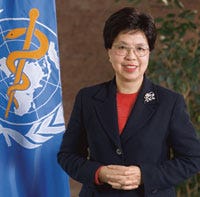SPI, McCormick proactively address H1N1 concerns ahead of NPE2009
Officials from the Society of the Plastics Industry (SPI; Washington DC) and McCormick Place met following the World Health Organization’s (WHO) June 11 declaration that the H1N1 or swine flu virus is a global pandemic, ensuring attendees of NPE2009 (June 22-26) that they will take every precaution possible to protect showgoers.
June 16, 2009
Officials from the Society of the Plastics Industry (SPI; Washington DC) and McCormick Place met following the World Health Organization’s (WHO) June 11 declaration that the H1N1 or swine flu virus is a global pandemic, ensuring attendees of NPE2009 (June 22-26) that they will take every precaution possible to protect showgoers. Those precautions include the installation of hand-sanitizer stations throughout the convention center; daily cleaning of all shuttle buses; and additional cleaning measures instituted by all Chicago hotels.
|
In a statement, SPI president and CEO Bill Carteaux described the moves as strictly precautionary, adding that the U.S. Center for Disease Control has stated there are currently no restrictions on international travel, either within or from outside the U.S. “It is certainly not my intention to make light of concerns regarding the H1N1 pandemic,” Carteaux said, “but the plain fact is that in the United States, aside from a few temporary school closings, the situation continues to be ‘business as usual.’” Carteaux added that the WHO decided against restricting global travel on the basis of mathematical modeling that showed travel bans would do little to stop the virus from spreading. Carteaux also noted that some 30,000 attendees from more than 100 countries signed on for NPE2009 after the initial press coverage of the H1N1 virus, adding that he would bring his entire family to Chicago, with 80% of SPI’s staff heading to McCormick Place.
In a June 11 statement to the press, Margaret Chan, WHO’s director-general, raised the influenza pandemic alert level from phase 5 to phase 6 since the strain was “novel” and spreading “easily” from person to person, with nearly 30,000 confirmed cases reported in 74 countries. Chan did note that the global health community’s early reaction to the virus and investments since the SARS outbreak would aid the battle against H1N1.
“No previous pandemic has been detected so early or watched so closely, in real-time, right at the very beginning,” Chan said. “The world can now reap the benefits of investments, over the last five years, in pandemic preparedness.”
Chan stated that the H1N1 virus preferentially infects younger people, with the majority of areas where there are large and sustained outbreaks predominately affecting people under 25. Around 2% of cases have developed severe illness, with many of those rapidly progressing to pneumonia. Severe and fatal infections have largely been in adults between the ages of 30 and 50, with many of those individuals having pre-existing medical conditions.
As of June 12, the U.S. has the largest number of confirmed cases, with just over 13,000, followed by Mexico with more than 6200, and Canada with almost 3000. In Europe, the largest number of confirmed cases comes in the United Kingdom (822), followed by Spain (488), Germany (95), France (73), and Italy (56). In the Far East, Japan has 549 cases, with 188 in China. There are just over 1300 cases in Australia. Out of this large number of cases, there have been 145 deaths.
Chan did say that WHO continues to recommend no restrictions on travel and no border closures. “Influenza pandemics, whether moderate or severe, are remarkable events because of the almost universal susceptibility of the world’s population to infection,” Chan stated. “We are all in this together, and we will all get through this, together.” —[email protected]
About the Author(s)
You May Also Like



